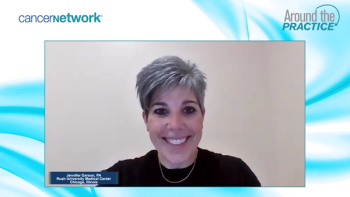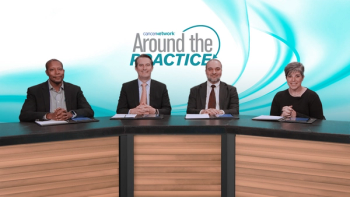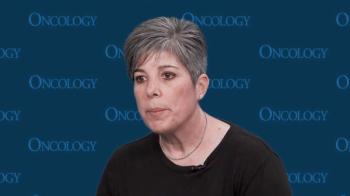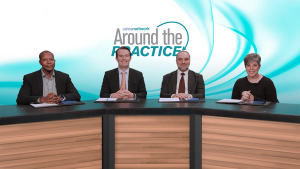Articles by Jennifer L. Garson, PA-C

A panelist discusses how tazemetostat offers a convenient, mutation-independent oral option for third-line follicular lymphoma treatment, balancing efficacy and tolerability while addressing patient lifestyle and financial considerations in an era of advanced therapies like CAR T-cell and bispecific antibodies.

A panelist discusses how advances in follicular lymphoma treatments have expanded options beyond third-line therapy, emphasizing individualized, multidisciplinary care that integrates medical, psychosocial, and logistical support to address the complex needs of often older patients managing an incurable disease.

A panelist discusses how treatment decisions for relapsed/refractory follicular lymphoma (R/R FL) hinge on prior therapies, balancing goals between remission and disease control, while considering patient factors like age, access, and preferences among options such as CAR T-cell therapy, bispecific antibodies, and oral regimens.

Panelists close the discussion by offering insights and future perspectives on the treatment landscape for follicular lymphoma.

An expert discussion surrounding the evolving treatment landscape for relapsed or refractory follicular lymphoma in the third-line setting and beyond.

Faculty review potential adverse events (AEs) seen in patients receiving treatment with bispecific antibodies and discuss preferred strategies for AE management.

Expert oncologists offer considerations for the use of CAR-T therapy and bispecific antibodies in follicular lymphoma and discuss potential challenges that may limit the use of these agents in clinical practice.

An overview of the evolving role of CAR-T therapy in patients with relapsed or refractory follicular lymphoma.

Panelists review the previously presented patient case and discuss alternative treatment strategies in early disease progression with expert insight on preferred treatment approaches for this setting.

Expert oncologists discuss best practices surrounding treatment follow-up and monitoring for patients with relapsed or refractory follicular lymphoma.

Faculty highlight recent changes in treatment guidelines surrounding the use of PI3K inhibitors in follicular lymphoma and discuss the evolving role of these agents in the treatment landscape.

Hematologist/oncologists describe the rationale for treatment approaches targeting EZH2 and discuss recent guideline updates surrounding the role of tazemetostat and EZH2 testing in patients with follicular lymphoma.

Experts review data updates from the AUGMENT trial and discuss potential clinical implications of these study findings.

An overview of available treatment options for relapsed or refractory follicular lymphoma and with considerations for treatment selection and expert insight on preferred treatment approaches in the second-line setting.

A panel of experts present that case of a 65-year-old woman with follicular lymphoma and discuss potential approaches for treatment in the relapsed or refractory setting.

Expert oncologists discuss the evolving treatment landscape for follicular lymphoma and highlight key advances that have contributed to improved treatment options.

The education of patients on identifying and reporting adverse effects is a critical part of effective toxicity management.

One role of a physician assistant is to help patients understand their treatment and the results they’re presented with.

Adverse effect management is a concern for clinicians when administering follicular lymphoma treatment, and the use of targeted pathways may help mitigate them.





